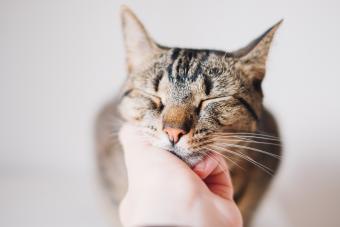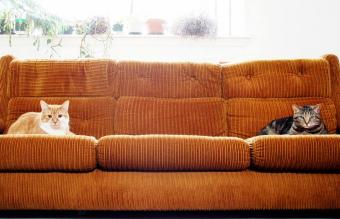
If your older cat is not eating much, has unusual sleeping habits, or shows other behavioral changes, it can be difficult to determine whether this is a normal part of the feline aging process or a sign of a more serious problem. Consider some of these common questions and concerns that come with owning and elderly cat.
Behavioral Changes in Senior Cats
Although it can be distressing to watch, realize it's not unusual to notice that your elderly cat's behavior has changed significantly. Some of these behaviors are related to medical conditions and others are simply the effects of growing old. If you're concerned about their behavior, it's best to contact your veterinarian and discuss the best ways to make your senior cat comfortable.
Typical Senior Behavior
Some behaviors you should expect to see as your cat ages include:
- Litter Box Issues
- Disorientation (known as feline cognitive dysfunction)
- Becoming very quiet or unusually vocal
- Increase in hiding behavior
Older Cat Won't Eat
An elderly cat's appetite comes and goes, and he may only eat when the food has a lot of water. Even with the wet canned food, he may not eat all the food and he will eat small portions throughout the day. As his appetite decreases, he will begin to lose weight and it may be difficult to get him to gain any weight.
Why Your Cat Won't Eat
There are any number of things that might cause an older cat to have weight loss.
- Decaying teeth
- Kidney problems
- Sensitivity to food
Suggestions for Addressing the Issue
Speak to your vet about changing his diet to find more palatable choices that will entice him to eat. You will probably need to switch to wet food. You can also try to hand feed him with a spoon and his food to see if this helps. You also should always keep fresh water available for him.
Suggestions for Litter Box Issues
A decrease in his regular eating habits can lead to occasional constipation and inappropriate elimination, such as relieving himself on a bed in the house. He may not go to the bathroom in his litter box. He also may leave droppings all around the house and urinate anywhere, with preferences towards plastics bags, books, and newspapers that have been left on the floor.
Dealing with House Soiling
If your cat is experiencing senility, he may have been unable to remember where his box was, and this could exacerbate the house soiling. Confining him to a smaller area, such as a baby gated room with a litter box close by might help the situation. You can also place more than one litter box in the confined area and be sure to clean them out daily.
Cat Stumbling and Disoriented
- Your older cat may have trouble walking and fall down the stairs or bump into the walls. This may also mean she cannot climb onto beds or tables anymore.
- You may also observe her acting as if she doesn't know how to maneuver around simple objects like walking on a comforter or reaching her water dish.
- At night, she may also start crying for you, even when she's on the bed right beside you.
- Another issue that happens more at night is problems with jumping down from the bed.
Vision and Other Causes of Disorientation
- At this age, this behavior could be caused by any number of things. Your older cat may be having some problems with her vision. Older pets often get cataracts. You will see a cloudy covering over the eye of a pet with cataracts. Although there are some surgeries that can be done your vet may advise against the trauma of surgery and anesthesia for an elderly cat.
- She could have an ear infection, diabetes or some other feline health issue that is resulting in her disorientation.
- A set of pet steps for your bed and couch can help with getting on and off furniture. The steps may become a regular part of your household as your cat moves into her final years.
See Your Vet
You should take her to the veterinarian for a checkup if you see her disoriented and falling. Your vet will be able to rule out the cause of her balance problems and medications can ease some problems.
Elderly Cat Is Ill
In addition to your cat not being himself for some time, you may notice him having many problems all at once. The frequency of his having medical issues is also likely to increase. As a cat ages, his body will begin to deteriorate. Some typical issues are:

- Upset stomach
- Lack of sleep or sleeping more
- Eating and drinking small amounts or not at all
- Dehydrated, thinner skin and brittle nails
- Kidney function problems
- Hearing loss
- Impairment or loss of vision
- Dental disease
Diagnose Causes of Underlying Pain
It's also quite common for a senior cat to have some pain which could be due to any number of things. It could be something as simple as arthritis or something a bit more serious. Your veterinarian can do a complete diagnosis. The vet may be able to prescribe some medications that will help alleviate his pain and facilitate other problems such as gaining weight.
Body Shutting Down
He may be well on his way to his end time depending on his level of bodily misfunctions and sad as it is, you should begin preparing for humanely easing him out of his pain.
Changes in Senior Cat's Habits
Another common change in a senior cat's behavior happens with indoor/outdoor cats. She may stop coming inside, other than to eat. Or she may stop going outside altogether.
Thinking About Why Your Cat Has Changed
It helps in this situation to go over all the changes you have seen. Some questions to ask yourself and your family if you do not live alone:
- Have there been any significant changes in your household over the last three weeks? New carpet, new addition to the family, new pet? Sometimes a big change can make an older pet feel out of sorts.
- How's your cat's current health? Have you noticed any changes? If so, this could also cause a behavior change such as the one you're currently experiencing.
Suggestions for Addressing the Issue
There are a few ways to address the issue.
- First, take her to the vet for a baseline checkup. This will help you understand her current health as well as alert you if any changes come up.
- If you want her to stay in more, try making her indoor environment especially inviting. Give her a nice fresh litter box and perhaps a few new catnip toys. She might also enjoy a comfy bed or a cat tree to mimic some activity she enjoys outside. You will probably have to build gradually the amount of time she spends indoors, so she doesn't protest too much.
- If it's the reverse, and the cat does not go outdoors, you might want to provide her with environmental enrichment such as comfortable window perch or a cat tree by a window or screen door. You may have to her up or down, but she will appreciate the effort and enjoy watching birds and other fun aspects of the outdoors. It's possible she simply does feel safe outside any more, and since she is becoming infirm it's a good idea to encourage her to stay inside so you can keep an eye on her.
Normal Aging Process
It's normal to notice that your aging cat's behavior has changed from when he was in his prime. Be reassured knowing that just like people, cats can slow down and change in behavior as they get older. There will come a point where you don't want to allow him to become more anxious and upset at veterinary visits. At that point, it's time to decide there is nothing more to be done, in consultation with your vet.
Cherishing the Time You Have Left
You may still have a few good years left with your cat, but you also should begin to prepare yourself for the day it's clear that the vet has done all he can do. You want to avoid causing the cat more stress and anxiety in his final months or years of life.
Spend Time with Your Cat
Still bring your cat into your favorite areas to spend time with you when you can supervise him. This will give you quality time together and alleviate the rest of the problems currently taking place throughout your home.
- If he doesn't want to eat, hand feed him if he will take it, and make sure you feed him the highest quality cat food you can afford. He probably will prefer wet food which is easier to eat and is more enticing.
- Brush him several times a week too, as he may not feel up to grooming himself.
- Continue to see the vet, and if you aren't happy with the treatment options, don't hesitate to get a second opinion. But know that there will come a time when you want to move him on to the rainbow bridge if you believe he's suffering and there's no more that can be done to help.
Coping with Elderly Cat Behavior
It's tough to see the changes in a cat that was once young and spry and full of life. Knowledge of what to expect and what to contact your vet about will make it easier for you and your cat. When you make the difficult decision, there are resources for dealing with pet loss and comforting words to help you cope with your grief.







